#about tabletop role playing games
Explore tagged Tumblr posts
Text
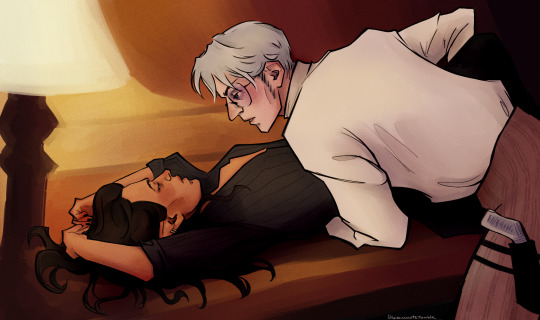
[PERC'ILDAN]
What are they doing? Option A: they are getting ready to play TTRPG; option B: they are actively assembling an Ikea table.
I picked secret third option
#look this silly fool drew a background#liltaire's art#digital art#critical role#critrole#critical role fanart#tlovm#vox machina#the legend of vox machina#critical role tlovm#legend of vox machina#percy de rolo#percival de rolo#percival fredrickstein von musel de rolo iii#percival fredrickstein von musel klossowski de rolo iii#vaxildan#vax'ildan#perc'ildan#percildan#percy x vax#vax x percy#i'm sending my condolences to the table#once again don't tag it as p*rcahlia thanks#basically me and my lovely spouse talked about perc'ildan and tables and certain table activities so this art was born#my spouse says they are getting ready to play tabletop games#second option: they are assembling Ikea table#pick you option i guess#i picked secret third option
201 notes
·
View notes
Text
Wraith: The Best Game That Never Was
It occurred to me that even among RPG nerds Wraith is more obscure, and that makes me sad. Like people know it existed, but even at the time it was an also-ran. Among insiders at White Wolf it was a darling, but it never took off, so they stopped its line half way through. Even in high school I had to buy the books used online.

Wraith is one of the most original and compelling approaches to the afterlife I've seen in any medium, but especially in an RPG. In many games ghosts feature as NPCs, but rarely do you get to play as them, and even more rarely in an interesting way that centers the subjective experience of being dead.

The first thing that grabbed me was the art, all faded gray-scale, scratchy, often grotesque and surreal. The cover is striking: stark gray bound in chains. All far bleaker and genuinely scarier than anything else put out by White Wolf. Turns out the art matched the vibe of the setting very well, because the ultimate conceit of Wraith is that if the living knew what the afterlife is really like, we'd all be even more terrified to die.
youtube
Wraiths are a violation of the laws of nature. Biological life is already an improbable struggle against entropy, but the continued existence of consciousness after death? An absolute affront to the universe. Reality wants you gone, but you can't be killed. That contradiction manifests as Oblivion: non-existence as a visible, active force; the Freudian death drive become physics. And it goes all the way down into your very thoughts.

The afterlife is a world of ideals, not materials. Your well-integrated mind shatters into pieces when you die, and your "physical" form is a manifestation of it. Your Jungian shadow-self, once an unconscious and abstract thing, becomes a real, tangible person living inside you. All your vices, your self-loathing, your misanthropy, your death drive, become a voice in your ear: your best friend and worst enemy, helping and tricking you, constantly trying to gain control.
But you can't be killed. You're already dead. Instead of death, you just decay, further and further towards becoming your shadow. Eventually all that's left is a nightmare of who you used to be, existing only to torment others and drag them down together into nothingness. The world is full of these monsters, the things that go bump in the night and terrify both the living and the dead.

But that's literally the tip of the iceberg. The thin layer of shadow reality is nothing compared to the much larger expanse of the Tempest: a cosmic plane of dream and nightmare, right on the edge of Oblivion. The deep underworld is Lovecraftian Mad Max: an infinite shifting desert of eternal night filled with screaming storms, incomprehensible monsters, and forbidden knowledge. Pockmarking it are islands of stability upon which societies are built--dysfunctional city-states desperately attempting to project power into a world constantly trying to swallow them.

However, if no-one can die, then every awful political trend and tyrant remains forever. And they all have a huge head start on you establishing political power. Their society is a veneer of modern industrial capitalism, layered on top of mercantile guilds, layered on top of feudal lords, layered on top of a Roman imperial bureaucracy, all built on the back of one ancient wraith: the ferryman Charon.

But the Emperor has been missing for a long time, and the bureaucracy is so massive and old that it's rotting in on itself. Who knows how many are secretly succumbing to their own shadows? Their attempts to rule the rest of the underworld are always tenuous, like the last days of Roman Britain. It's a world eternally mid-apocalypse.

The problem with a world of thought and feeling is: how do you make things? What do you make them with? Sometimes the ghosts of physical objects make their way through, and they're mined like whale fall. Undoubtedly the Twin Towers were a huge boon to the dead, probably the site of an entire city.
But it's not enough. Wraiths are still people. They want clothing, and furniture, and buildings, and machines, and tools, and money. Where does all that come from? The only thing left that wraiths can touch: other people. Wraith society is built on a form of slavery more exploitative and horrifying than anything that's ever existed among the living. Slaves are valued not for their labor primarily, but for their use as raw materials.

The vulnerable newly dead are captured, dragged back to the capital, and molded in workshops and factories into goods for the upper classes. They claim it wipes out consciousness, and thus the finished product isn't suffering. If anything it's a mercy! To release them from the torment of the afterlife! And prevent them from becoming monsters! But when it's quiet, if you listen closely, some report you can hear it all whispering.

The bleak alienness of this afterlife to any human religion breaks the minds of many when they first realize they're dead. Some go into denial. Some reject their old religion. Some invent new religious explanations. And some try to twist their old beliefs into a shape that conforms.

The underworld is full of cults. Cults promising escape from the underworld. Cults claiming they know where heaven and hell are. (At best just projections of the collective beliefs of the living into the underworld.) Cults who claim they're building heaven and hell themselves. (These sorts of "afterlife lands" sometimes become tourist attractions.) But Oblivion is Oblivion. If you could describe its structure logically you would be contradicting its very essence. There is only decay.

Most people don't go to the shadowlands when they die. Where do they go? No-one knows. What happens when you're swallowed by Oblivion? No-one knows. Is there a God? No-one knows.
Just like when you were alive, you don't know what comes next, or why you're here. It's not real death, it's something in between. But maybe real death is just nothingness. Better not to risk it, then... even if that means clinging to the sands of Hell under the yoke of an eternal slave-aristocracy.
Maybe if you can figure out why you're here, you'll find a way out.

#Honestly this isn't even all of it#I barely touch on their politics#And I didn't talk at all about the relationship between the living and the dead#Or about how wraiths “die” when attacked#Never talked about the Venous Stairway or the Labyrinth at the heart of the underworld#TTRPG#death#worldbuilding#writing#fantasy#horror#White Wolf#Wraith the Oblivion#ghosts#religion#slavery#economics#political science#roleplaying#tabletop roleplaying#table top role playing game#afterlife#art#cosmic horror#Lovecraftian#psychology#Carl Jung#Jungian psychology#Freud
9 notes
·
View notes
Text
I make these little mood boards my my and my party's D&D characters and figured I'd share :)
(I claim none of these images as my own, they're just from pinterest. This is just for fun.)
This homebrew campaign took place in a land called Arcadia. The group was affectionately called "Kylar Verinius, and Others". It was the first full campaign we saw through to the end and it holds a special place in my heart :)
1 | Minerva "Minnie" Grace Honeyhill | Lightfoot halfling, life cleric in service to Cyrollalee | Guardian of the Eternal Knowledge
2 | Narzar Drak | Githzerai, kensei monk
3 | Ketari | Tiefling, druid of the circle of the land | Ambassador to the Feywild
4 | Kylar Verinius | High elf, hexblade warlock, Storm sorcerer | Wielder of Dayrend
5 | Stilte Van De Maan | Tabaxi, shadow monk, knowledge cleric in service to Selûne | Master of the Jadeshoe Grove Monastery
6 | Smasherino | Stout halfling, berserker barbarian
7 | Raven | Shadar-Kai, ranger | Champion of the Raven Queen
8 | Mixim Nozzleflog | Rock gnome, armorer artificer | Beloved NPC and resident Wiki








#dungeons and dragons#dnd5e#dnd#d&d#d&d 5e#dnd character#ttrpg#tabletop role playing game#i will take any opportunity to talk about our characters if anyone end up being curious
7 notes
·
View notes
Text
ethel’s going steady with ben….. that’s actually really sweet good for them 🥺
#i might cry about it later actually#what if in one life we didn’t get to be together because of evil tabletop role play games and you died but in another life we were happy……..#like whatever i don’t care.#beth.txt
7 notes
·
View notes
Text
Reblogging because the pre-order is over and now you can just buy it.
Hello everyone looking for a new fantasy tabletop game!
You can buy Exalted Essence now.
What's Exalted you ask?
Exalted is an epic fantasy TTRPG where players play the titular Exalted - humans elevated to superhuman/demigod status - in a wild and unique setting that draws inspiration from the ancient world rather than medieval Europe. Creation (the setting) draws key inspirations from the entire world. If you're used to having to make yourself visible on your own in other fantasy, there's probably some representation in Exalted.
It has explicit queer and trans themes about finding your people, creating your own identity, and having the power to punch back at the people who hate you. This isn't incidental. The writing staff is queer as hell. You can hear me break this down more here.
Curious to learn all you can? Well you can get a detailed overview of the entire game on the podcast Systematic Understanding of Everything hosted by myself, @presidentofbirds and @phillycuriosity
If I'm used to D&D 5e why should I pick this up?
Well, I presume if you're reading this post you're already interested in trying something new, so:
The entire game in one book. Exalted: Essence is self contained, character types, equipment, enemies and all!
An exciting style of fantasy that's different than classic D&D but like, textually gay, and very easy to have scenes like ballroom fights, epic galas, and touching homoerotic healing scenes - no house rules required.
But also, tactical depth and combat you can really sink your teeth into if fighting monsters and villains is your bag.
An excuse to use all your d10s at once
Character building and advancement mechanics designed to be familiar to a 5e audience. Characters "level up" based on story beats, and have Advantages, which are functionally similar to class and race features.
A world welcoming to most heroic archetypes, so it's easy to convert your favorite OC.
Extremely kissable dragons, demons, gods, elementals, ghosts, faeries, and unnamed ancient horrors
I'm a fan of a previous edition, what's Essence got for me?
Design focused on alleviating some of the previous versions' missteps
Virtues are back, baby
2e fans will find it an improvement from second edition's mechanical strengths - it's pretty easy to convert all your favorite 2e Charms to XS.
Streamlined versions of familiar rules to make it painless to introduce new friends to the game we love.
The Cliff's notes on Ex3's new Exalt types.
Did I mention it's all of Exalted in one book?
How does it play?
d10 dice pool looking for 7,8,9 as successes. 10s count as two successes, which can lead to explosive, heroic outcomes
Combat system designed to keep all players engaged the entire time - even characters who aren't focused on fighting at all.
Combat also narrows the gap between experienced and new players and players who want to win at RPGs and players who just wanna vibe so GMs aren't tearing their hair out trying to balance encounters.
Social system designed to resolve in a single roll so you can be immersed in role play and not interrupt it with constant rolling - without sacrificing a variety of social approaches
"Ventures" system for characters working on long term projects from traveling across the world to crafting magical wonders to building communities without forcing this to be "downtime" activity
Characters have access to Charms - exception-based special powers that make them extremely good at whatever they focus on.
It's easily my favorite game (and the project I developed that I'm the proudest of), so I'm excited for everyone to try it out.
#TTRPG#Ttrpg recommendation#exalted#Exalted Essence#d&d#Exalted RPG#exalted rpg#ttrpg#fuck wizards of the coast#Try a new game! How about this one?#ttrpgs#Cmon in the water is fine#tabletop rpg#tabletop games#tabletop role playing game#tabletop#tabletop roleplaying
721 notes
·
View notes
Text
The Myths of the Satanic Panic: A Hard Time for D&D Players
Dear Readers, in the annals of Dungeons & Dragons (D&D) history, there exists a chapter that remains etched in the collective memory of players and enthusiasts alike—the era of the Satanic Panic. This dark period, spanning the 1980s and early 1990s, saw D&D come under intense scrutiny and condemnation from various quarters of society. Accusations of promoting Satanism, encouraging occult…
View On WordPress
#d and d#D&D#dnd#dragons#dungeons#dungeons & dragons#Dungeons and Dragons#gaming#myths about tabletop gaming#role playing#Satanic Panic#tabletop game
0 notes
Note
So what about FATE? How is it not universal as an RPG?
The biggest non-universal dimension of FATE – at least in its modern incarnations – is that it has a very strong set of baked-in assumptions about the relationship between players and player characters.
This is something I've talked about in the past; to somewhat oversimplify, there are roughly four ways for a player in a tabletop RPG to relate to their character:
The Isekai Stance: I am my character, and my character is me. I'll have my character do whatever I myself would do if I happened to be, for example, an elf wizard.
The Actor Stance: I'm an actor, and my character is my role. I'll have my character do what I feel it would be psychologically realistic for them to do under the circumstances.
The Storyteller Stance: I'm a narrator telling a story, and my character is the co-protagonist of that story. I'll have my character do whatever I feel would make for the most interesting story.
The Gamer Stance: I'm a person playing a game, and my character is my playing-piece. I'll do whatever it takes to win.
This generally isn't a useful way to classify either players or games; games typically have weak baked-in assumptions about which stance their players will adopt, and to the extent that these assumptions are present, a game may make different default assumptions for different parts of play. A common set of assumptions is actor mode outside of combat and gamer mode in combat, for example.
FATE is, of course, an exception to the rule, in that it has very strong baked-in assumptions about what stance players will adopt toward their characters, and further assumes that play will occur at least mostly in this mode. The Fate Point economy that forms the core of the gameplay loop 100% assumes that you're going to be playing in storyteller nearly all of the time – the types of decisions it's asking players to make on a moment-by-moment basis are frequently straight up unintelligible from any other perspective.
This is a big part of why suggesting FATE because it can "do anything" can go over like a lead balloon: the folks making this suggestion aren't taking into account the possibility that a given group's players may not vibe with the system's assumptions about how players relate to their characters. Storyteller-mode-all-the-time is actually a fairly uncommon group play style, and it often seems that FATE fans don't realise this!
2K notes
·
View notes
Text
I occasionally see people complain that stereotypes of trans women even in our own online communities are often about us being nerdy shut ins, and how they say that’s unfair and inaccurate. But besides the obvious selection bias that in online spaces people who are shut ins that spend most of their time online are going to be more prevalent than those who spend less time online, I feel like it takes a bit of willful ignorance to pretend that nerdy shut ins don’t make up a very large portion of transgender women for very material reasons. Most of the transgender women I know have a few things in common:
We grew up uncomfortable with our bodies
We spent most of our lives prior to transitioning feeling like something is very wrong and feeling like we don’t fit in with most of society
We frequently fantasized about a life that could be different
Again there is a very real amount of selection bias in this because basically every trans woman I know is also mentally ill and spends most of her time online. But again I feel that the material reality of being a person who feels uncomfortable with themselves, feels like they don’t belong, and often fantasizes about a life where they didn’t have those problems very much would cause said person to gravitate towards being nerdy and/or a shut in. And that is intensified if you consider the statistically higher percentage of trans women that are autistic (the autism-transgender connection is a whole different topic but there is a statistically significant overlap). To a person like that, video games, tabletop role playing, and online communities where you can present yourself how you’d like are all very attractive things. And if so many of us gravitated to those things before transitioning, existing in this world that is so deeply cruel and unaccepting of trans women only pushes us further into using those as our outlets.
I won’t pretend to have any statistical or other knowledge to make sweeping statements about that making up the majority of us or anything, and I also recognize there is selection bias inherent to this discussion and that my view is limited as an American white woman. But I will say that I don’t think it should be necessarily surprising or disappointing to anyone that online communities of transgender women tend to focus on talking about the types of transgender women that make up the majority of those communities: the ones who spend more time online
#Delia original#idk what to tag this. just some of my thoughts on a sentiment I’ve seen some times#that always feels a little disingenuous to me
1K notes
·
View notes
Note
My roommate made a joke about wanting to play a sonic the hedgehog tabletop game. Is there a ttrpg for that?
THEME: Sonic the Hedgehog.
Your roommate is about to be surprised because there isn't just a single Sonic ttrpg. There's at least seven.

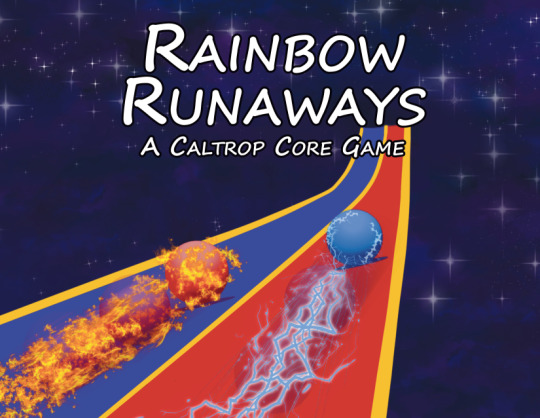
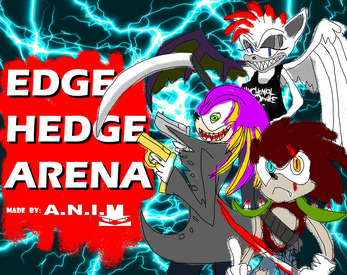

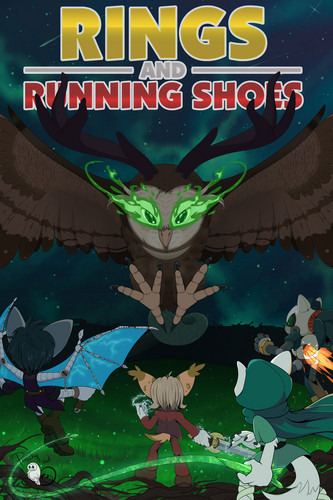
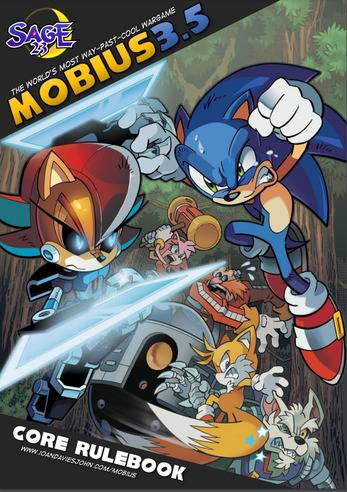

Speeding Bullets!, by Princess Grace.
In SPEEDING BULLETS!, you play as three to five intrepid, plucky anthropomorphic animals on a quest to save the day- or end it. It’s up to you, some six-sided dice, and your beloved SO (Shadow Operator) to determine the fate of the world.
SPEEDING BULLETS! is a single-page Lasers and Feelings hack where your stats are FAST! (hero) and GUN! (antihero). You and your friends will create Sonic OCs, randomly assign them backstories like "Dark Warrior's Advent" or "Purification via Ruination" from a table of 326 genders, and put them up against insurmountable odds, Dr. Robotnik, and their own rivals.
Lasers and Feelings games all have the same basic premise: you have one number that represents your abilities in two different stat, in this case, Fast and Gun. Rolling above the number is good for one stat, while rolling below the number is good for the other. Roll your number exactly? Then something special happens.
What Speeding Bullets takes from Sonic is rivalries, a perpetual quest to defeat Dr. Robotnik, and an alternate suggestion for playing as your character's rivals, taking references from Dark Mirror. The game also comes with a Gender Table, a roll-table that appears to reference every Shadow the Hedgehog ending.
Rainbow Runaways, by UkeleleBard.
You are an animal living in a human’s world. The humans have found you, and the military will pursue you with every weapon, vehicle, and trap they have at their disposal. You’ve only got one option. RUN!
Rainbow Runaways was created for the Caltrop Core game jam, and runs on the Caltrop Core engine by Titanomachy. You can play it Solo, or with a GM, with a deck of cards and a 1-3 d4's per player.
The goal is simple: escape the military by reaching the edge of the city. You track this by using a clock with 12 slices. The deck of cards represents the actions of the military as they pursue you. Your character is composed of three stats and three techniques.
All in all, Rainbow Runaways is succinct and to the point. I think one of the benefits of fan games like this is that much of the lore is already assumed to be known by the players, and as a result reading the game book can be much quicker, since you just need to learn the rules.
Edge Hedge Arena (Beta), by ANIM TTRPGS (@anim-ttrpgs).
Throughout all human history, people have been given names. You thought yours was only mean to be used as an identifier, but you were wrong. Your name was chosen carefully, with the conscious (or subconscious) knowledge that one day it would inextricably link you to a champion of immense power who is also a hedgehog. This “game” serves as a set of instructions for revealing this mighty guardian, so they can defend your honor and name in a battle to the freaking death!
Still in the early stages, Edge Hedge Arena is partially a battle game. This is firmly a pvp game, using your weapons, powers and style to give you an advantage in the arena. However, first and foremost, Edge Hedge Arena feels like a bit of a love letter to the Sonic Fandom, more than Sonic itself. When you make a character, you actually have to search for art of a hedgehog OC online!
Chaos & Control, by farmergadda (@farmergadda).
Chaos & Control is a hack of Lasers & Feelings by John Harper, inspired by a similar hack, Steel & Spirit by Occupied Hex. In this game, Players will take on the roles of colorful, cartoony animal people and go on adventures through fantastic locations, facing off against maniacal foes, and looking really cool while doing so.
Another Lasers & Feelings hack, Chaos & Control adds the use of character types to further differentiate your characters, as well as tokens that can be used to trigger powerful moves unique to your character. For the GM, there's a number of roll-tables to help generate locations, problems, badniks, and so much more.
Rings and Running Shoes, by RingsandRunningShoes.
Welcome to Sonic's World - A universe unique and beyond what you know from the SEGA games! Where, inspired by Sonic and other heroes of the franchise, you and your friends will create a team of heroes that will save the world from the forces of evil!
The system is based on PbtA with heavy modification to fit the care-free power fantasy of Sonic's Adventures, but anyone familiar with the core game, should know the basics. On a very surface level the gameplay loop consists of alternating between "Peace and Quiet" and "Stages" sections. During P&Q your group will rest, prepare for the Stage, roleplay and develop your characters.
One of the benefits for PbtA games is playbooks. Playbooks keep most of the information that a player will need to know in one place, allowing you to choose a character type based on vibes, and then make selections within just the options provided to you. It's excellent for minimizing choice paralysis, and it can make teaching the game simpler, as each player has a number of references to the rules that are specific to their character in front of them at all times.
Mobius, by Ioan Davies-John.
Mobius is a fan-made tabletop wargame based on Archie Comics’ 24-year run of Sonic the Hedgehog, allowing you to fight Large Skirmishes in the gone-but-not-forgotten take on Sonic's World!
It features stats for all your favorite heroes and villains, and rules to suit every play-style from hordes of Eggman Robots to squads of elite Freedom Fighters. There’s an ever-evolving plethora of army books and supplements to represent the many factions within the pages of the world’s most way past cool comic!
Mobius is a tactical wargame, focused on moving little guys around on a map and taking down your opponents. There's plenty of minutiae here for folks who love figuring out what strategies work for them, including various extra rules, as well as 14 different factions to choose from. If you're not sure who you can play this with, the designer has a link to their community discord on their Itch page!
If you want something a little different in theme but similar in spirit, you might interested in Davies-John's other sonic game, a naval wargame set in the same universe: Egg Fleet!
Radical Spin, by Will Uhl (@raffitheowl)
Will you beat your evil twins, stop the robot army, and survive the perils of high school?
Radical Spin is a micro-RPG about melodramatic action animals. Hedgehog heroes, will you beat your evil twins, stop the robot army, and survive the perils of high school? Live out your bad fanfic fantasies today!
I don't know much about this game, but based on what I can find out about it, it seems to be designed to shine when you're exploring Sunday Morning Cartoon-style plots. I'm expecting characters with abilities that are larger than life, as well as a fairly simple rule set that's easy to pick up and learn without much trouble.
You might also be interested in...
My Silly Games recommendation post, which has a link to a Sonic game called Spindash!
I've also got a Ko-Fi account where you can leave me a tip if you like what I do!
172 notes
·
View notes
Text
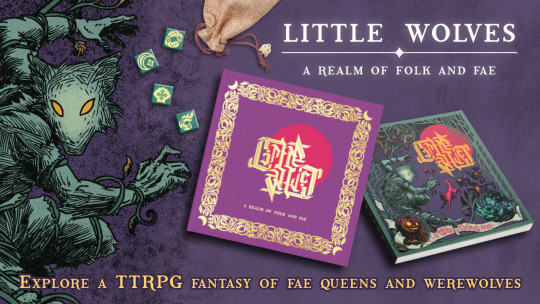
Little Wolves is crowdfunding NOW!
It's finally here, y'all! The crowdfunding campaign for our tabletop RPG of folk tales, fae queens, and werewolves is live on Backerkit~
Support our work here!

From the award-winning publisher behind Motel Spooky-Nine, You’re In Space And Everything’s Fucked, Dinocar and more, Little Wolves is a tabletop role-playing game about adventuring through a realm of folk & fae as shapeshifting werewolves.
In Little Wolves, you’ll craft real-world paper masks that represent their characters, modifying them over the course of their adventures to reflect the marks their experiences leave on them while transforming between your Wolf and Mortal forms!
The crowdfunding campaign aims to bring the game’s vivid world to life in an 8.5” x 8.5” full-color perfect bound book loaded with gorgeous art from a team of 4 artists accompanying setting & mechanics from award-winning designers Julie-Anne Muñoz and Nevyn Holmes.
The crowdfunding campaign launches May 14th, running through June 11th, 12pm US Central with an initial funding goal of $19,500 USD with plenty of stretch goals to unlock for more art, more content, and even an expansion!
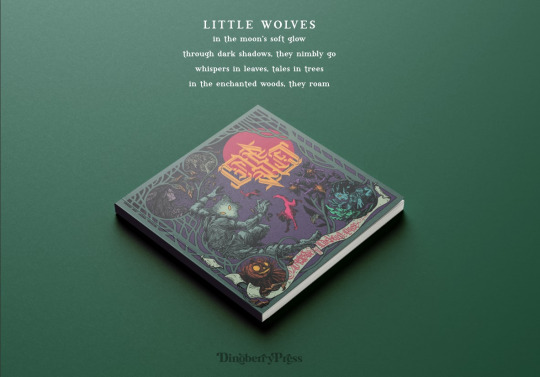
Making masks & shifting forms
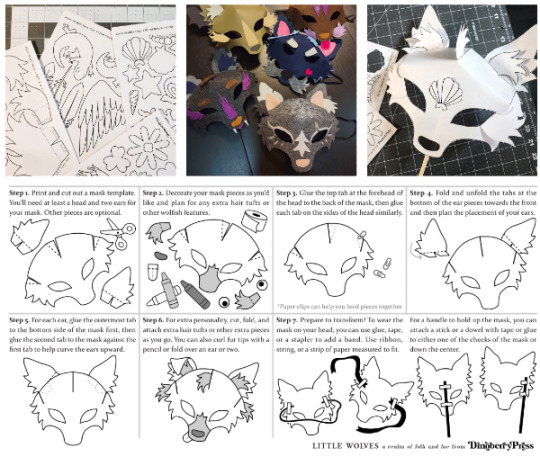
In your Wolf form, you have access to the benefits of your beastly Attributes, can sing magical Spellsongs, and can resist harm with your Resolve. In your Mortal form, you'll switch your Attributes, Spellsongs, and Resolve out for strong, flexible Mortal Powers that can turn the tide of any situation they're used in. Through character advancement, you can strengthen yourself as you see fit. Perhaps you favor one form over the other, or you may switch between them frequently. The choice is yours.
The Enchanted Forest
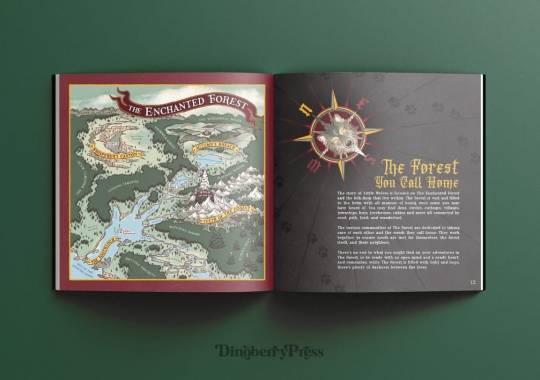
As you explore this dense forest you'll meet the powerful and mysterious Queens and aid them, and their courts, through all manner of quests and favors. As a werewolf, you're uniquely gifted in traversing the forest, capable of making it to every edge of the woods, meaning that only you can learn its deepest secrets.

✨ A free demo/quickstart for Little Wolves is available to download and play, get it here! ✨
#tabletop#game#indie#tabletop rpg#ttrpg design#ttrpg#crowdfunding#roleplaying#indie ttrpg#trpg#wolves#werewolves#werewolf#fae#folklore#folk tales#faewilds#magic#witch queen#pumpkin queen#troll queen#mermaid queen#elemental#backerkit#fairytale#fairy tales#queens#fae queens#fae queen#furry
471 notes
·
View notes
Text
Help Us Choose Our Next Game!
We received so many wonderful submissions from the indie ttrpg community of games to play next on Tiny Table. We need your help to narrow them down! We will be taking the top 3 games to Patreon for our patrons in the Mini and Micro tier to vote on.
Reactors and Romance: Reactors and Romance is a rules-light RPG about flirting while piloting a giant robot. You only have one stat, and that is your HEAT 🔥. Your HEAT measures how hot your mech's reactor is getting, and how hot of a pilot you are 😉 Will you fight or flirt your way through battle? Can you keep your mech from overheating? What will it be hotshot?
To Infinity...: Inspired by Alien and The Thing, "To Infinity..." is a tabletop social deduction game where up to 4 players and 1 GM need to escape on a spaceship from an alien monster who killed the rest of the crew. What none of the survivors know is that this isn't just a monster, the alien could be any one of them...
Hellborn Descended: Hellborn Descended is an infernal TTRPG set in a modern Hell, inspired by comics and shows such as Hellboy and Helluva Boss. In Hellborn, players take on the role of sinners, demons, and fallen angels, working together as mercenaries to attain wealth, fame, and power, or gloriously die trying. Check out their kickstarter!
Darkest Hour: Darkest Hour is a horror tabletop game inspired by horror movies of all kinds, featuring a group of monster hunters attempting to put a stop to a malicious supernatural entity in a single night. Over the course of six rounds, known as the Hours, the hunters must use their abilities to establish benefits that will aid them even as the haunt grows in strength and the hunters become less effective. As Blackest Night envelops them, the haunt feels insurmountable -- will the hunters find the haunt's true weakness and destroy it for good, or be whittled down until only a Final Girl remains? Featuring six haunts, six locations ripe for the haunting, and six unique hunter archetypes, Darkest Hour is perfect for one-shots for 2-5 players, and can either be run by a GM, or communally without a GM.
Dawn of the Orcs: Dawn of the Orcs is a GMless dark fantasy worldbuilding and roleplaying game. Play the magical technocrats who create the first orcs as living weapons and tell the story of how the Orcs become their own people. It can be played seriously as a fantasy transhumanist Dr. Strangelove, or as a wacky game of Saruman by committee.
The Trains of the Glorious Republic of the People: The Trains of the Glorious Republic of the People is a tabletop RPG where players take on the roles of a train crew in a fictional 1930s totalitarian state. Your mission is simple: get yourselves and your unique train from point A to point B though things are never that easy on the tracks of the Glorious Republic. The game requires only d6s, pen, paper, and, above all, your loyalty to the party.
Paratype: Paratype takes place in the aftermath of an apocalypse where giant bugs have reclaimed the earth. For humans survival is a challenge-one helped by the invention of a device that grants strange new buggy abilities. Paratype is a game about survival, humanity and so, so many bugs.
Broke Wizards: Broke Wizards is a light, silly game about working class sorcery. Play as students of the prestigious Audment's Academy of the Arcane who must go delving for treasure in order to pay tuition. To cast magic, wizards must use items found around their dormitory as makeshift spell ingredients - and then use their real-life argumentative skills to convince the living force of magic that yes, actually, a dirty shot glass is a great ingredient for casting a spell of water breathing, thank you very much.
RiskTaker: RiskTaker is a GM-less system built around players making big moves with big risks. Each sessions revolves around "The Scene," a climactic event like an episode's final battle in a superhero TV show, or the aftermath of a heist gone wrong. Players take turns either doing exposition scenes to give context to The Scene and built character relationships, or Influencing The Scene, which means they take a decisive action and decide how effective that action will be. But watch out - the more impactful your action, the more things can go wrong, and the more likely it is that they will. But what's a good story without a few Risks?
'til it kills us: in ‘til it kills us, you play as a group of young, reckless queer activists fighting to make a difference in the world. you’re angry, and you’re scared, and rightfully so. not to mention, you’re all a little bit fucked up. whether you’re dealing with issues at home, struggling with mental illness, or just learning to stand on your own two feet, life isn’t easy. but you’re also in love with the world, and with each other, so you keep fighting anyway. it’s the only thing you can do. the only problem is your magic. sure, it protects you. sure, it helps you fight. but you can feel it – feeding on the most unpleasant parts of you. and the longer you have this magic, the more you fear by those feelings. you worry it might be powering but you keep fighting. what else is there? remember what you always said: we’re going to keep on fighting ‘til it kills us.
If you submitted a game to us and don't see it on the list, don't fret! We will be hosting many polls like this and your game is still in consideration. If you game is on here and isn't chosen to move on to our next poll, also don't fret! We may add it on to the next poll again.
#indie ttrpgs#indie ttrpg#ttrpg#tabletop rpg#ttrpg podcast#tiny table#reactors and romance#paratype#'til it kills us#RiskTaker#Broke Wizards#Dawn of the Orcs#The Trains of the Glorious Republic of the People#Darkest Hour#to infinity...#hellborn descended
166 notes
·
View notes
Text
Jerry Stokes - Champion Card Player and Professional Goober
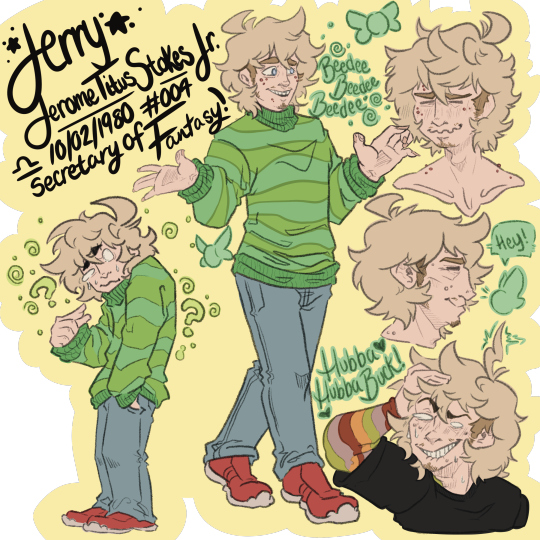
Jerome “Jerry” Titus Stokes Jr. [10/02/80] [6'0. Yes, Bill is mad about this.] Secretary of Fantasy and Role-Playing Games AOL / Online Users: [XxLordxXxAtrocityxX] Theme Songs: Chronically Cautious - Braden Bales | Undone - The Sweater Song - Weezer | Polygon Dust - Porter Robinson Favorite Shit: Middle-Earth, Magic Cards, Percentile Dice, He-Man, Final Fantasy, Dragons, Tabletop Gaming, Conan, Studio Ghibli, Discworld, LARPs, Legend of Zelda, Earthsea, Yawgmoth’s Will, Gen-con, Xena, Aerith Gainsborough, Elfquest, White Magic
Therapy, check. Meds, check. Keys, check. Godsend Card Wars deck, check. EXTRA Card Wars deck in case some fucker tries to one up him, check... shit what is he forgetting *now*? It took him growing a backbone and his parents to finally get his ass to the doctor, but hey, at least he's here now, right??? right????? He's still trying to get Bill to come with him to the office to deal with his anger issues but it's like trying to climb Mordor bro; not gonna happen any time soon.
He's managed to make some new friends in the process, who knew?! Actually going to tournaments is so much more fun than just following Bill around all day--
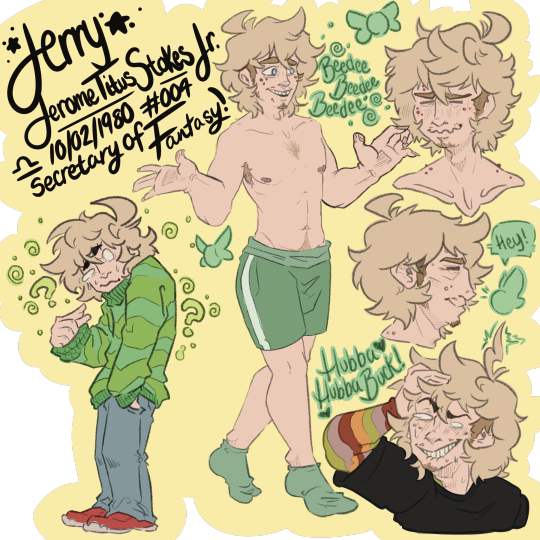
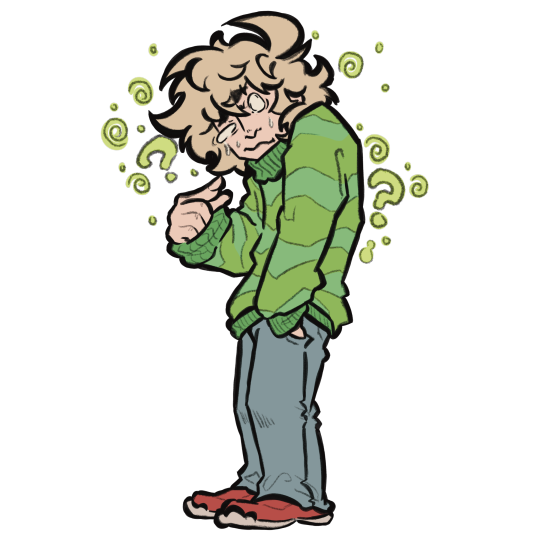
I have the Power!
Jerry used to take Piano, as his parents tried to get him into as many extra curriculars when he was in elementary as they could to get him out of their hair (And.. hey, at least he learned something..?)
Because of this, he occasionally plays by himself on the practice piano he got as a kid, though usually it's just him learning soundtracks or transcribing the entirety the Ocarina of Time by ear.
y'know. normal everyday shit.
He has a habit of forgetting to trim his nails, however he keeps them relatively neat-- filed down and this dude actually showers and washes his hands like a maniac if he gets dirty, so it's not that bad. Plus, he's convinced it helps him pick up cards better without folding them.
Let's be honest, Jerry forgets a lot of things sometimes in his anxious scramble to get places. Including meals on occasion, which usually results in Josh jumping him as an excuse to get another snack for them both.
Would be willing to have his nails painted, absolutely, but will probably pick it off within the day as a fidget. Sorry guys.
Jerry met Matt at a Card tournament and they became rather quick friends-- and Matt whooped his ass when they played so he had to give the guy some props.
This dude gets the WORST bedhead and he barely does anything about it, just don't make fun of him if his hair is flat in the back please please please--
Jerry. Likes. Stripes. I feel like his mom dressed him up as the Girl who got sick with the Stripes once when he was a toddler cause he got covered in paint and it just *stuck*.
Jerry has also worn the same style of shoe and brand for the past 15 years he's not gonna start changing it now, fuckers
Can you tell he has a separation issue? no? then open your EYES.
This man absolutely gets ass his phone and aol are blowing UP like ALL THE FUCKIN TIME and he's so overwhelmed that he just ignores them all most of the time. most.
He ends up mostly subsisting off of tournament winnings and doing random odd jobs around the neighborhood, but at least it's enough to get him more cards and a bus ticket into Manhattan when he needs it.
Jerry still goes Bee-dee Bee-dee, he doesn't drop it entirely until post 2005-ish, when he meets Mandi. He DOES however, still use Buck as a nickname, cope. it's my world now.
cough uh he hates the feeling of underwear. those are basketball shorts. OOPS
god I love Jerry he's such a little dork

OKAY JOSHYBEAR IS NEXT Im gonna sob I also still have to draw May and Matt's cards...

fyuck
#the eltingville club#the helltingville club#eltingville fanart#welcome to eltingville#eltingville jerry#jerry stokes#eltingville club#my art#digital art#my headcanons#im so tired#eltingville oc#ugghhhhhhhh#scrawny motherfucker#gangle boy
122 notes
·
View notes
Text
Coming this winter:

Book 1: Cliath
In 1992, White Wolf Publishing released the first edition of Werewolf: the Apocalypse to the public. Throughout the 1990s, it rapidly grew to become one of the most played role-playing games of all time, and this persisted well into the noughties when the series concluded with the Revised (3rd) edition.
Its a game that speaks to the core fears many of us hold about the uncertainty of the future. Of corporations harming the world to meet their profit margins, of everyday people whose homes and lives are destroyed by disasters caused by those corporations or by storms that wouldn't have been so severe even a decade before. Of politicians who sell agencies to those who pay them the most to make the most vulnerable groups in society even more vulnerable. Of people who don't even have that. It looks you all in the eyes and asks you to be enraged. It asks you to care while handing you the tools to do something about it. Then, you get to work. You don't just blow up the factories; you empower the little guy, heal communities, and confront the stagnant society that you've become a part of, and you have to be responsible custodians of the greater world around you while not trying to be consumed by the very darkness you fight against. It was as intense as it was touching, heartbreaking, and entertaining. At times its just as absurd (and nuanced) as real life.
It was revolutionary at the time for the space it held at the tabletop. Werewolf was the first tabletop roleplaying game ever made that defaulted to using feminine pronouns in all Player and Storyteller interactions, as well as the default pronouns of the Garou in its first three editions. For its many flaws, it saw itself as the first tabletop roleplaying game that held any space for Indigenous groups. It made activism a core theme of the game itself, and would conclude its books with a list of related real-world demonstrations where the players can get involved in protecting the world around them, just like the werewolves they represent at the tabletop.
The Garou have intricate and multi-layered cultures from their written language to their oral histories, the way they dress, and the ways they manifest across editions were presented with very little overlap when it comes to the multiple facets across their society, leading to a rich history and complex societies for Storytellers to weave chronicles together for their troupes.
Dark Surrealism Awaits
The World of Darkness is implied to exist just beneath a facade that all others take for granted as simply being a world gone wrong. Can you feel it? In a world of burning forests, flash floods, social inequality and seemingly worse things emerging day after day — a world where everything feels wrong and nothing in the world feels right — you are not alone.
The universe is itself a living organism, thrashing like a panicked animal at the biting darkness, and we, the Gaians, are those who join the fight to protect it. You are one of Gaia’s chosen warriors, about to experience your First Change, and become swept into a world of ancient warriors and sacred purpose.
We monsters ask nothing of you—other than to join us.
Book 1: Cliath includes • Over 300 fully annotated pages with cross-referencing and book citations for Storytellers to delve into the deeper lore of WtA • Cross-edition compatible character creation rules for Fifth edition and legacy games • Comprehensive information on the histories, societies, and politics of over 20 Tribes • Laws, Tenets, traditions and rites for 3 new factions • Downtime and Questing mechanics • Detailed breed information and roleplay tips on how to play a wolf • Full sept breakdowns including roles and duties • Over 600 level 1-3 Gifts in a whole new presentation • 7 New Patrons • New Renown system and detailed ranking info • Comprehensive character creation rules • Dozens of story seeds to get your players started • A localized Pacific Northwest setting with Sept, legends, and over 20 new NPCs • Citable information on first changes and rites of passage

Read our introductory comic, Cracking the Bone
Read our latest project update here
#world of darkness#werewolf: the apocalypse#werewolves#wta#werewolf the essentials#werewolf#w5#wod5#wta5#werewolftheapocalypse
101 notes
·
View notes
Text
Have you played DETECT OR DIE ?
By Ben Klug

I'm just going to let the game's blurb on itch speak for itself:
A tabletop RPG of neo-noir empiricism, unstable detectives, and total ego death & resurrection. Inspired by science fiction stories of memory and detection like Blade Runner (1982) and Disco Elysium (2019), Detect or Die places the players as the various inner voices of the Detective, collectively embodying the fractured psyche of an amnesiac protagonist attempting to solve the Case. One player takes on the role of the World, laying out the setting and mystery for the rest, using a bespoke variation of the Powered by the Apocalypse game engine influenced by Blades in the Dark and Bluebeard's Bride. The rest play Personality Components, the fragments of the Detective's Ego who combine investigative competencies with erratic coping mechanisms, trading off control and emotional stamina to make it through the Case to the ultimate revelations - about the World and about the Detective.
145 notes
·
View notes
Text
I've been giving a lot of thought lately to the way that tabletop game systems shape the expectations and behaviors of the people who engage with them. I think that the way that they encourage or discourage attention is interesting, and I've written on this in the past.
Another thing that interests me is how the difference in design encourages different styles of engagement with them. You can break Fiasco out as a party game at the right party; D&D requires that you engage with it for thirty or forty sessions to get the most mileage out of it and get to an interesting level, and a whole range between those poles.
(I was going to make a joke about MÖRK BORG players having to plan around stealing catalytic converters and arraignments related to same, but I restrained myself.)
But how much of this is down to the culture of the game and table, and how much is down to the system itself?
104 notes
·
View notes
Text
Golems and Eureka: Investigative Urban Fantasy
I did a writeup about how a character based on the Jewish folkloric golem might work in Eureka: Investigative Urban Fantasy! It includes a short essay about the thematic implications of the golem, and a set of custom rules for living dolls made of unfired clay.
If you don't know what Eureka is, it's the first tabletop RPG by @anim-ttrpgs, an up-and-coming indie studio making carefully designed and rigorously playtested tabletop games outside of the D&D 5e ecosystem. Eureka is a system for stories where amateur investigators look into intricate and (sometimes deadly) mysteries, trying to get to the bottom of whatever conspiracy is at hand. It also has robust rules for a variety of supernatural phenomena that may or may not exist, letting players explore the thematic and logistical implications of people who are vampires, man-eating alien shapeshifters, supernaturally animated dolls, or a variety of other strange creatures. It's one of the best RPGs I've ever played or read, so if you're interested in finely crafted tabletop games, mystery and detective stories, social commentary on the rights of "unsavory" marginalized people, or just supernatural creatures that eat people, I'd recommend checking it out.
My writing under the cut!
(I wouldn't normally post my own long-form writing here, but I felt good about this and also couldn't pass up an opportunity to talk about Eureka. This isn't very polished, so ignore any typos or awkward wording, but feel free to check it out and give your own thoughts. Enjoy!)
Thoughts on golems in Eureka (Essay – Rules below!)
Contrary to how the word is usually used in English-language fantasy media, a golem in its original context is not just a generic term for any supernaturally animated artificial creature. (If it were, then it would be more or less synonymous with Eureka’s use of the term “living doll” to begin with!) Rather, it refers to a specific creature in Jewish folklore: a facsimile of the human form made out of clay, animated by various words of power placed in or on its body, acting as a source of protection and power for the impoverished and oppressed communities which created it. It is a servant which exists to meet a need of its community, animated by the power of God as channeled through the expertise of a meticulous member of the Jewish community. (Arguably the most notable difference from the genre fiction definition is this inherently Jewish perspective. The creation of a golem is a closed-practice, specifically Jewish tradition, and also, the tradition of Jewish mysticism implies high degrees of specialized knowledge – some written down in studied texts, and others discovered by training under a mentor or interacting with other Jewish leaders. In this way, the golem implies a degree of studiousness and community engagement on the part of its creator, both of which are heavily emphasized values in Jewish spheres.)
My analysis of the thematic role played by the golem is probably best represented in the best-known folkloric golem, the golem of Prague. In this story, a 16th century rabbi of the Prague synagogue creates a humanoid form from clay with the purpose of protecting the ghetto (in this context, the dedicated Jewish quarter of the city) from pogroms and other antisemitic attacks, animating it into a golem by inscribing holy words on its head or placing a scroll of those words in its mouth. Things go wrong in ways which vary from telling to telling, with a common version of the story stating that the golem becomes too dangerous and destructive, and the rabbi removes the inscription of the holy name to render the golem dormant (although rather than destroying his creation, he preserves it in the synagogue’s attic to be reanimated if it’s ever needed). In a fun bit of wordplay, some tellings describe the holy inscription as being the Hebrew word “emet” (“truth”), which is only one letter away from the word “met” (“dead”), with the idea that the rabbi deactivates the golem by erasing a single letter. More traditional interpretations would describe a formula consisting of various divine epithets, either instead of or alongside the previous method. In the Jewish mystical tradition, names of God are thought to be emanations of God’s own glory, and invoking their power in specific ways is seen as a way of causing things beyond the bounds of normal reality.
A few thematic points jump out at me about the golem, both from the story of the Prague golem and from the broader characteristics of the golem. One is the fact that a golem is implicitly lacking in personal identity. Golems are almost never named, and they have very little agency in their own stories – in almost every version of the golem of Prague, for instance, it is deactivated because it has gained too much autonomy. It fights the wrong people, uses too much force defending its community, or even just falls in love, and so it is too dangerous to keep around. Even the terminology being used implies this lack of identity, as it etymologically derives from a Biblical Hebrew term, used only once in the Tanakh, which describes the unfinished form of a human before God breathes life into them. A golem is not perceived as a fully formed individual, but rather as an extension of its creator, built by someone else’s will and discarded whenever it isn’t needed. To me, this has a high degree of relevance to the themes associated with Eureka’s living dolls, who often also grapple with defining their own identity and purpose in the absence of their original context. Their unique struggles evoke concepts of alienation and depersonalization, and I think a golem without a master would have to deal with all of the same issues on that front as they navigate life as a newly independent person.
Golems as a whole, and especially the story of the Prague ghetto, also raise another problem that can create thematic conflict for a character: in their attempts to defend vulnerable people in their community, they can end up making situations more dangerous, rather than helping to defuse them. When the golem of Prague rampages, in many tellings, it doesn’t fully stem the tide of antisemitic antagonism. Instead, it destroys more of the ghetto and allows the gentile population to create a post-hoc justification for their hatred of the Jewish community. In the context of Eureka, I think that this can be a powerful metaphor for how the fear of oppression can lead people to become paranoid, closed off, and destructive to themselves and others. A golem whose purpose is to protect and serve the people around them might want to do just that, but if they find themselves in a situation where superhuman strength and stamina can’t solve a problem, they may be in way over their depth, and they might accidentally harm other people when they try to navigate that. (My use of the phrase “protect and serve” here is no accident – one of many inspirations for this thematic element is people who call for increased police presence in their neighborhoods, even when those communities are more harmed by over-policing than they are by crime. Being afraid and wanting to support their community spurs them to action, but it also blinds them to approaches that don’t use force.) For example, one golem character I’ve come up with has had to flee her home and change her name because she saw someone being harassed, didn’t know her own strength, and intervened in the first way she could think of: violently. She was lucky not to be arrested.
To get a little bit more specific, this theme is most specifically inspired by my own experiences in discussions among members of the Jewish community, as the scars from millennia of marginalization, expulsion, and murder don’t fade quickly. Paranoia is a veritable norm even within our households and places of worship. In our homes, many of us keep passports readily available if there’s a need to escape or show identification, and during any prayer service at a synagogue, there will likely be armed security guards standing at the door. Many of us laugh about it, but there’s a degree of genuine fear that we can’t shake. Often, that fear is harmless, but it can get exhausting to live with, to say little of how it affects other people or how it can be weaponized by bad actors. One look at how the Israeli government seeks to justify its violence in propaganda makes clear that the generational trauma of Jewish communities can be exploited and warped as a means to justify some pretty awful things. The figure of the golem is, in a sense our communal power fantasy – it’s comforting to think that with a bit of ingenuity and some elbow grease we can design our own hero to protect us and help us thrive – but even that fantasy is not free of the reality that, like a superhero, a golem’s innate abilities just aren’t always enough to save everyone. (Indeed, this tension is part of what inspired the Jewish creators of Superman: he has superhuman abilities that he uses to protect vulnerable people, but not every problem can be solved by punching it, and with all his strength he has to be very careful not to destroy everything he loves. This has been noticed by a lot of people, and I’m far from the first to bring it up, but in particular I’d say this observation is borrowed from the excellent video essay “The Golem and the Jewish Superhero” by Jacob Geller on YouTube.) A golem being fleshed out as a character can really lean into that tension.
One more theme I want to bring up is not something I’ve come to any particular conclusions about – it’s really just a few spare thoughts I’ve had rattling around, and an invitation to look into this concept more. It comes out of my research on the development of the word “golem” in Hebrew and Yiddish, as the term has developed beyond just the connotation of a humanoid clay form. It can be a pejorative term like “fool”, but more interesting to me is its use in reference to embryos and pupas. This made me consider the transitory nature of the golem as a representative of change, which I haven’t seen explored very much in any stories out there. Not only has the word gained those connotations, but also, looking at the characteristics of the golem as a creature gives some more fuel to that fire. The fact that it’s generally made out of specifically unfired clay gives it the sense of being unfinished. Its nature of being created in its adult form from the very beginning means that it can display a childish outlook as a seeming adult learning about the world outside of its creator’s life. The story of the golem of Prague even has an ending hook entirely centered around the idea of the golem being temporarily disabled but capable of being reanimated if need be. This idea of a golem as a character with a unique capacity to adapt and change hasn’t been explored very much, but I think it could be interesting to consider.
The last thing I’ll leave here is thoughts on character creation beyond themes. In this document, I’ve included a custom set of rules to play a living doll made of unfired clay, which is the traditional material for a golem. This isn’t playtested in any way, but since Eureka doesn’t try too hard to be balanced around physical attributes, I think it should probably work fine – it’s more thematic than anything. To make a golem, the doll’s purpose should be external in some way, pushing them to help and support other people in their community, especially the most disadvantaged of them. In terms of backstory, the details of a golem’s past can be left fairly foggy if you’d like, but the one thing that can’t be skipped is that they were intentionally created by a Jewish creator invoking Jewish traditions. It’s fine to make a living doll that was animated in some other way, but the character would not be a golem in that case. It’s similar to how Eureka vampires must have some association with Christianity, not because non-Christian undead monsters can’t exist, but because outside of that context, the specific vampire mythos lacks any meaning. (Honestly, also, if you don’t have background information about Jewish life and culture, I would recommend asking someone who does to help with your portrayal.) Finally, in terms of giving a golem a hook to investigate a mystery, it could of course be anything, but there’s one aspect in particular that I would consider: in some versions of the Prague golem’s story, it protected the ghetto by looking into cases where Jews were accused of murder and finding the true culprits, thus clearing the names of the accused. Which is to say, there’s genuine historical precedent for golems investigating mysteries, and it often happens as a means of helping people who are falsely accused of a crime. That’s not mandatory, but it could be fun to keep in mind. Have fun, and if anyone ends up playing a golem investigator using these guidelines, please let me know!
Wet Clay Living Doll – Rules
A living doll made from earthenware materials that have not been hardened by firing. This variant was originally designed to represent the golem of Jewish mythology, but it could also be used to portray, for example, an unfinished art project or a proof of concept for another piece. Depending on their construction and the flexibility of the clay they are made from, they may be treated as jointed or unjointed.
Wet clay living dolls weigh more than twice as much as an average person of their size would. They cannot swim or float, and will sink to the bottom of any body of water immediately.
These living dolls take half damage from all weapons while they have at least 1 point of Superficial HP remaining. Damage from falling is unaffected. Wet clay living dolls are immune to electrical damage.
When a wet clay living doll encounters fire or high heat (in excess of about 500 ºC), their outer layer of clay is fired and becomes hard and brittle. When this happens, this living doll should be mechanically treated as an unjointed living stone statue. If another character has access to tools to chip away the outer layer and a large supply of wet clay to replace it, they can reverse this process with a Full Success on a Technology roll. Regardless of the result, this process will take 1 Tick of time and cause 1 Superficial Damage to the living doll.
Wet clay living dolls are easier to repair. Do not apply the -3 Technology penalty when restoring Penetrative HP.
Wet clay living dolls generally possess superhuman strength, but when they are hurt, they may lose chunks of clay that would otherwise generate weight and power. They have a +5 Contextual Bonus to Athletics and Close Combat, but for each point of sustained Penetrative Damage, this bonus is reduced by 1 point.
Given 1 Tick of time, appropriate tools, and a supply of clay, a wet clay living doll can alter their physical appearance and proportions. They cannot precisely change specific details such as facial features, but can make themselves larger or smaller, change their perceived distribution of fat and muscle, and change the shape of their body enough to be recognizably different. When a wet clay living doll attempts to alter their body, roll Technology.
Full Success: The living doll successfully alters their body to exact specifications. They are able to completely alter their facial features and/or specify a new height and body type, and even on close scrutiny they will not appear out of the ordinary.
Partial Success: The living doll mostly succeeds in altering their body, but they get sloppy. They take 1 Superficial Damage, and close inspection reveals that parts of their skin have abnormal marks and blemishes, but they are still able to make the changes that they hoped for.
Failure: The living doll struggles with even the most basic alterations, doing a messy and imprecise job. They take 1 Superficial Damage, and cuts and blemishes are visible across their skin. They also don't convincingly make the correct changes to their bodies, doing either too much or too little to differentiate themselves from their previous form.
#eureka: investigative urban fantasy#eureka#ttrpg design#ttrpg#indie ttrpg#homebrew#jewish#judaism#golem#game design#jacob geller#essay#my work#queer art#living doll#doll#jew stuff#urban fantasy#detective#investigation#noir#neo noir
62 notes
·
View notes